A Report on 26th International Conference on Environmental Management and Climate Change

The Institute of Directors (IOD), India, hosted the 26th International Conference on Environmental Management and Climate Change in Bengaluru (India) during June 26–27, 2025. The venue of the Conference was Hotel The Lalit Ashok in Bengaluru. The Theme of this year's Annual Conference was “Board Leadership for Climate Action & Promoting Sustainability”.
The famed Golden Peacock Awards, instituted by the IOD for 'Occupational Health & Safety', 'Environment Management', 'Energy Efficiency' & 'Eco-Innovation' for 2025 were also conferred on the winners during the Awards ceremony. The Convention was attended by around 400 participants, comprising industry and business leaders, board members, directors, policymakers, educationists, and private as well as public sector institutions. Both Central and State governments were also represented.
The Conference commenced with a distinguished panel of dignitaries who underscored the critical relevance of global warming and its implications for our planet's existence. The Conference focused on integrating climate action within corporate frameworks and highlighted the imperative of embedding sustainable development and climate finance into the organisation processes. Speakers collectively emphasized the significance of the emerging circular economy and offered strategic insights on achieving a carbon-neutral future for the mankind.
PLENARY SESSION - I
INAUGURAL SESSION
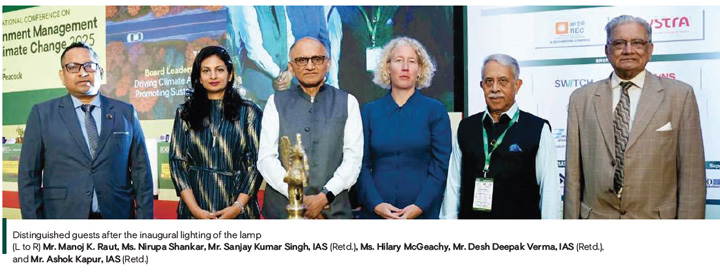
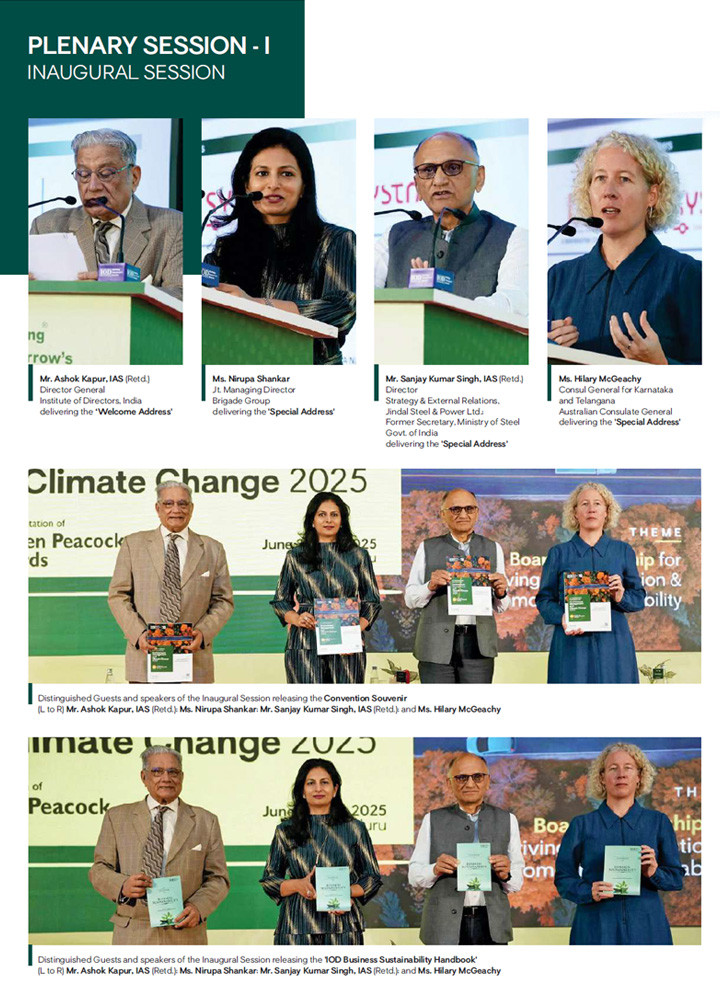
The session commenced with the ceremonial lighting of the lamp by Mr. Manoj K. Raut; Ms. Nirupa Shankar; Mr. Sanjay Kumar Singh, IAS (Retd.); Ms. Hilary McGeachy; Mr. Desh Deepak Verma, IAS (Retd.); and Mr. Ashok Kapur, IAS (Retd.).
The 'Welcome Address' was delivered by:
Mr. Ashok Kapur, IAS (Retd.)
Director General - Institute of Directors, India
Mr. Kapur set the tone for a hopeful and impactful conference. He acknowledged the presence of change makers and urged them to take greater action on climate change. Emphasizing the role of directors in driving policy and decision-making, he highlighted India's environmentally conscious spirit rooted in its philosophy and traditions. He noted that technological innovation today draws from traditional conservation methods, and that ESG is now a mind-set, not just an economic term. He called for stricter environmental laws and congratulated the Golden Peacock Award winners, concluding with a powerful reminder that environmental protection is no longer a choice, it is survival.
He quoted the UN Secretary General, Dag Hammarskjöld, who said “Mankind is racing in the Highway to Hell.”
This was followed by the 'Special Addresses' delivered by:
1. Ms. Nirupa Shankar
Jt. Managing Director - Brigade Group
2. Mr. Sanjay Kumar Singh, IAS (Retd.)
Director, Strategy & External Relations,
Jindal Steel & Power Ltd.;
Former Secretary, Ministry of Steel
Govt. of India
3. Ms. Hilary McGeachy
Consul General for Karnataka and Telangana
Australian Consulate General
Ms. Shankar spoke about sustainable efforts being implemented by her Brigade Group. She shared that India is the fastest-growing economy in the world today, but the ever-increasing population has led to extreme congestion, especially in metro cities. Building and construction sectors accounted for 39% of global emissions and 30% of energy costs. She spoke about how Real Estate could be a part of the solution, not the problem. Brigade Group has employed different companies like EcoSTP, Clairco and Strawcture in their manufacturing and construction processes. She outlined statistics about the sustainable efforts undertaken successfully so far, which included recovering 50% of construction waste, planting almost 1 lakh trees, water positivity, and aiming to construct all green buildings by 2040. Her presentation sparked a positive discussion on paving the way towards newer and more creative green solutions in growing sectors like building and construction.
Mr. Singh in his speech, addressed the fact that the global temperature limit on a 1.5°C increase according to the Paris Agreement had already been crossed. He provided the perspective of the steel industry, which is very robust and widespread in India. According to him, 12% of CO2 emissions are from the steel industry; 2.4 tonnes of carbon is produced per tonne of steel. He shed light on the fact that steel is a capital-intensive sector and decarbonisation of steel is cost intensive. He summarised the challenges that the steel industry faces with economic feasibility. He talked about green hydrogen as an upcoming clean fuel and how its cost needs to come down to at least 1$ per kg. Steel made from scrap metal has no emissions, but this process has a long way to go. He concluded with emphasizing how innovation and technology could not be ignored in Board decision-making.
Ms. McGeachy highlighted Australia's Sustainability and carbon neutrality measures, addressing climate vulnerabilities and the India-Australia relations in this field. She shared Australia's target to reduce emissions by 82% by 2050 through scaling EV adoption, biodiversity conservation, and expanding protected areas. Emphasizing inclusivity, she spoke about initiatives for training women and youth as rooftop solar technicians, who had already installed nearly 10 million solar panels. She also discussed end-to-end green energy supply chains and Australia's lithium surplus, which supports India's EV goals. Her address stressed global collaboration to mainstream renewable energy.
The session concluded with the release of the Convention Souvenir and IOD Handbook on Business Sustainability by the Distinguished Speakers during the inaugural session.
PLENARY SESSION - II
BOARD STRATEGY AND ACCOUNTABILITY FOR CLIMATE GOVERNANCE AND BUSINESS TRANSFORMATION
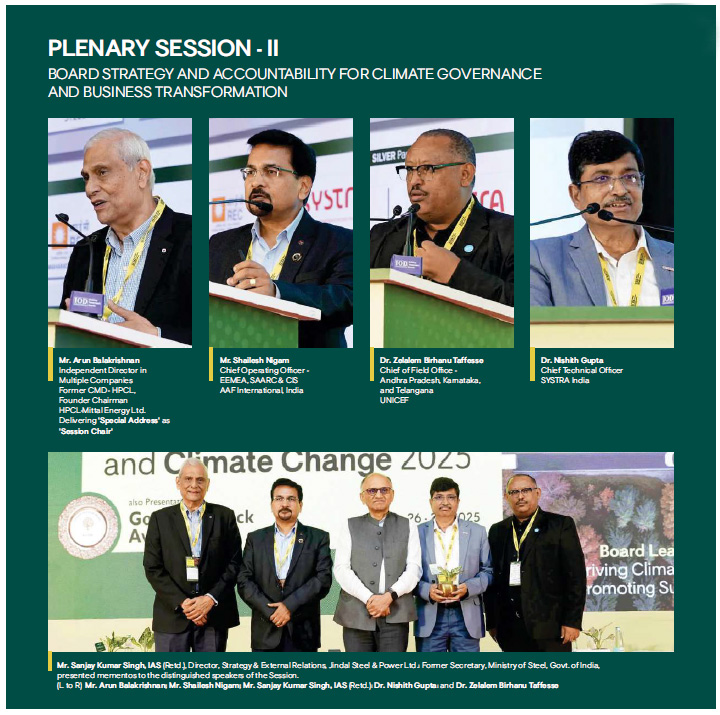
The session was Chaired by:
Mr. Arun Balakrishnan
Independent Director in Multiple Companies
Former CMD - HPCL
Founder Chairman, HPCL-Mittal Energy
Mr. Balakrishnan covered the evolution of environmental statutes in India since the pre-industrial era, citing the increase in chimney stack heights as an example of early pollution mitigation. He highlighted the Bhopal Gas Tragedy of 1984 and the subsequent Environment Protection Act of 1986. He discussed India's international climate targets and SEBI's mandate for the top 1000 listed companies to file Business Responsibility and Sustainability Reports from FY 2022–23. He noted that policies so far had been government-driven, not corporate-led. He provided insights on the fuel industry, including fuel consumption levels set by the Bureau of Energy Efficiency and greener practices like stopping tetraethyl lead use and sulphur hydro-treatment. He concluded by outlining the board's role in climate governance—aligning goals with business strategy, setting metrics, ensuring disclosure, and addressing risks.
The session had the following co-panellists:
1. Mr. Shailesh Nigam
Chief Operating Officer - EEMEA, SAARC & CIS
AAF International, India
2. Dr. Zelalem Birhanu Taffesse
Chief of Field Office - Andhra Pradesh, Karnataka, and Telangana
UNICEF
3. Dr. Nishith Gupta
Chief Technical Officer - SYSTRA India
Mr. Nigam made a presentation titled “Boardroom to Breathing room” where he elucidated the air pollution aspect, focusing on growing indoor air pollution. He referred to the increasing AQI of indoor environment as a “hidden crisis”. He discussed the effects of biological pollutants, combustion particulates and mineral contaminants. He talked about the inclusion of circular economy practices at AAF, which includes HVAC systems, filter media for recycling the air, recycling metals, green manufacturing and other sustainable designs. He urged the board members in the audience to stand up and take responsibility and explore clean air as a business opportunity, not just for environmental cleanliness but also to manage the indoor climate for better business conduct and transformation of lifestyles.
Dr. Taffesse gave an inspiring talk on the youth outlook in the ongoing efforts for a sustainable future. He advocated for Children's rights to live in a clean and safe environment, including youth in decision-making. Children are the future agents of change, and planning ahead should be a part of the board's strategy. He urged companies to move beyond CSR initiatives and reducing the carbon footprint by making recruitment strategies more inclusive and investing in the younger generation and so-called backward communities. He accentuated the importance of multi-sectoral engagement with the public sector, voluntary sector and local communities. His speech was an insight into the social aspects of the fight against climate change.
Dr. Gupta gave a brief description of the role of the mobility sector in the sustainability journey. He spoke about SYSTRA's operations in the public transport infrastructure and corporate responsibility to achieve the board-level targets for sustainability. He talked about his company's submission of the letter of intent to SBTI to reduce emissions. He narrated the implementation of Chennai Metro's 2nd phase and the cost-cutting of 25 thousand crores. He addressed questions from the audience about his corporations' agenda about dealing with the pressures of short-term profit goals as opposed to long-term ESG and sustainable goals. His talk was enlightening and insightful.
It was followed by an interactive Q&A Session with the large audience.
PLENARY SESSION - III
THE BOARD'S ROLE: DEVELOPING TRANSITION PLANS & ENSURING CLIMATE DISCLOSURES
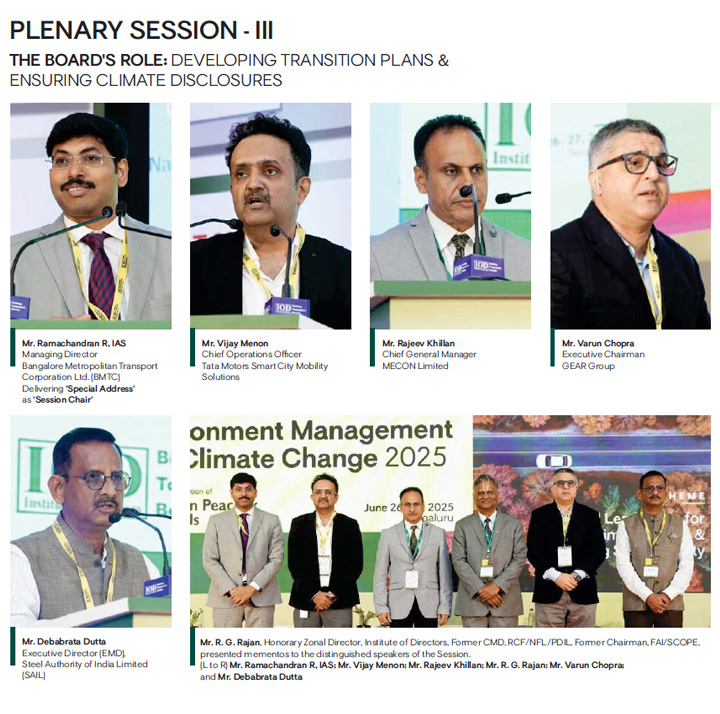
The session was Chaired by:
Mr. Ramachandran R, IAS
Managing Director
Bangalore Metropolitan Transport Corporation Ltd. (BMTC)
Mr. Ramachandran gave a perspective on the transport sector, which is one of the highest contributors to emissions, especially in Bengaluru. He briefed the audience on the measures being taken to make the public transport greener. He stated that they had stopped procuring diesel buses and are investing now in more electric buses. He stressed the importance of solar installations to make the energy supply (input) to the product (output) fully renewable and green. He spoke about integrating solar panels in new bus depots for electric buses. He was hopeful about being able to procure 4000 extra buses in addition to the existing 6000 buses. He underlined the necessity of green vehicles run with green power. He mentioned hydrogen fuel cell vehicles, an upcoming innovative technology for clean renewable fuel.
The Session had the following other distinguished speakers:
1. Mr. Vijay Menon
Chief Operations Officer
Tata Motors Smart City Mobility Solutions
2. Mr. Rajeev Khillan
Chief General Manager - MECON Limited
3. Mr. Varun Chopra
Executive Chairman - GEAR Group
4. Mr. Debabrata Dutta
Executive Director (EMD)
Steel Authority of India Limited (SAIL)
Mr. Menon spoke on the imperative for the board to achieve net-zero milestones and how to integrate them into day-to-day practices for Executive decision-making. He underlined the significance of finance and sustainability working in tandem, which starts with capital allocation for achieving the SDGs. He talked about supply chain strategy, identifying the weak links and providing transparency to all the involved stakeholders. He elaborated on 'risk assessment' and integrating climate risks into 'enterprise risk' management. He also spoke about capacity building at leadership and operational levels and examining the progress of the intended transition targets.
Mr. Khillan outlined the concept of green infrastructure and cleaner steel technologies. He cited examples of Sustainability measures taken by MECON to reduce their carbon footprint. He shared instances like 'zero liquid discharge' and treating, and reusing all the generated industrial wastewater, treating effluents like hexavalent chromium in water at their chromium mines in Odisha, and zero discharge of untreated water into water bodies. Their goal is to reduce Scope 1 and Scope 2 GHG emissions, and this is being achieved by reusing the gas in blast furnaces, direct rolling of steel, and planting green belts around the industrial campus.
Mr. Chopra highlighted the transition to 'net zero' emissions as a key objective for national and multinational companies. He discussed GEAR's budget allocation for climate targets and the draft notification on the Carbon Credit Trading Scheme. Emphasizing the supply chain as the starting point for carbon neutrality, he noted that GEAR now leads in zero-emission material handling equipment (MHEs). He compared lithium-ion and leadacid batteries, citing lithium's higher efficiency and sustainability. He shared that switching to lithium-ion batteries had saved 2.5 lakh litres of diesel and reduced 690 tonnes of CO₂. He also stressed the importance of reducing operational costs while improving outcomes and highlighted GEAR's inclusive hiring of more women and transgender forklift operators.
Mr. Dutta started his speech by reiterating the pressing need of the hour which is renewable sources of energy. He, like many speakers before him spoke about green hydrogen technology and its potential to replace fossil fuels as a primary fuel source. He suggested the removal of blast furnaces to smelt steel and hereby reduce the footprint of the industry. Another point covered by him was the Research and Development for sustainable targets which can be done by comprehensive climate funding and curating tie-ups with various other companies and industries. Mr Dutta concluded by saying that change begins at the leadership level.
This was followed by an interactive Q&A Session with the audience.
PLENARY SESSION - IV
SUCCESS STORIES IN EFFECTIVE IMPLEMENTATION OF 'ENVIRONMENT MANAGEMENT’ CASE STUDY PRESENTATIONS
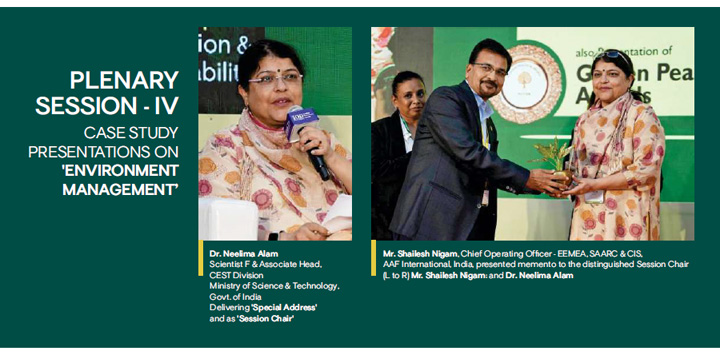
The 'Special Address' was delivered by:
Dr. Neelima Alam
Scientist F & Associate Head, CEST Division
Ministry of Science & Technology
Govt. of India
Dr. Alam stated that significant progress had been made in scientific and technological fields to foster Sustainability and reduce carbon emissions. She highlighted advancements in modern Seismology that aid in understanding Earth systems and disaster mitigation. Emphasizing translational R&D, she pointed to low-carbon technologies in hard-to-abate sectors like steel and cement, including CO₂ conversion into methanol and dimethyl ether. She noted the deployment and growing momentum of Carbon Capture and Utilization (CCU) technologies in the steel sector, supported by pilot projects assessing scalability. She stressed the role of public-private partnerships in accelerating green technology commercialization. She also highlighted Indo-Swedish collaboration in clean energy research and innovation. On e-mobility, she underscored EVs as essential to meeting emission targets, with infrastructure development underway. She concluded by sharing updates on water technology initiatives, stressing the need for sustainable water management to combat growing scarcity and pollution.
Case Studies in the 'Environment Management' category were shared respectively by the below mentioned companies:
1. TVS Motor Company Limited
2. Honda Motorcycle & Scooter India Private Limited
3. Kirloskar Brothers Limited, Pune
4. Lupin Limited
Each presentation was followed by an interactive Q&A Session with the large audience.
PLENARY SESSION - V
TRANSFORMATIVE TECHNOLOGY, INNOVATION, AND CAPACITY-BUILDING FOR SUSTAINABILITY
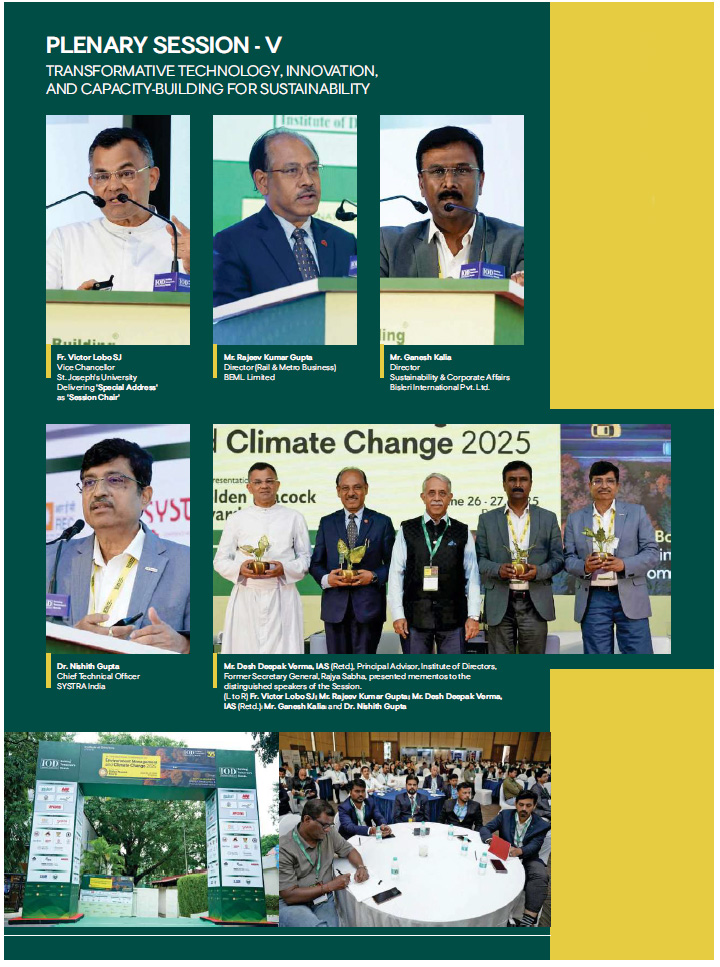
The session was Chaired by:
Fr. Victor Lobo SJ
Vice Chancellor
St Joseph's University, Karnataka
Fr. Lobo delivered an inspiring presentation on higher education systems and the SDG agenda. He briefly discussed the causes of Climate Change and emission sources and explained the distinction between 'footprint' and 'handprint' to the audience. Emphasizing student involvement, he stressed their role as future ambassadors of change & innovation. He cited initiatives by his university to promote sustainability, including the introduction of a B.Sc. in Environmental Science in 1980, which has since nurtured new climate leaders. The university operates a biogas plant for hostel food heating, recycles water in campus buildings, uses separate plastic recycling bins, and has planted native trees to green the campus. Fr. Lobo's presentation highlighted how smallscale efforts can drive significant impact in the larger ecosystem.
The Session had the following distinguished speakers:
1. Mr. Rajeev Kumar Gupta
Director (Rail & Metro Business)
BEML Limited
2. Mr. Ganesh Kalia
Director, Sustainability & Corporate Affairs
Bisleri International Pvt. Ltd.
3. Dr. Nishith Gupta
Chief Technical Officer
SYSTRA India
Mr. Gupta informed that urban mobility solutions had contributed to an overall net carbon reduction of 4.81 million tonnes. He spoke about the large-scale installation of a 23 MW wind energy plant and rooftop solar panels to reduce reliance on non-renewable sources. Under the 'Ek Ped Maa Ke Naam' initiative, 6,000 trees had been planted to enhance green cover and promote ecological balance. He reported progress across three key areas: R&D, product development for futuristic solutions, and the establishment of an innovation Incubation Centre and a Central Research Facility. He mentioned the launch of Mumbai's driverless metro and the development of the new Vande Bharat trains. He also noted the creation of advanced equipment like rope shovels and cleaner products for Indian Railways to boost efficiency and reduce environmental impact. Furthermore, regenerative metro systems have been designed so as to feed 20–30% of energy back into the system, contributing to energy savings and greater sustainability in public transport.
Mr. Kalia stated that while plastic is often criticised, PET has been scientifically proven as the safest form for packaging drinking water, with a lower environmental footprint than aluminium bottles. To address Waste Management and public participation, several MoUs had been signed with colleges across the country to support clean-up drives, install waste bins, and create effective collection systems. He reported that his company is working towards a zero plastic-to-landfill cycle, with a focus on collecting back 90–95% of PET bottles. He also shared fruitful reuse initiatives like making benches from recycled bottle caps. On water conservation, he highlighted the construction of ponds, check dams, restoration of a water reservoir in Leh, and widespread rainwater harvesting. He added that water trading, credits, and fiscal tools are being explored to promote efficient use and replenishment. He stated that 104% of generated plastic is being recycled, a unique achievement.
Dr. Gupta reported that CSR funds were being effectively used for sustainability and infrastructure projects, including pilot corridors near Minto Bridge and the Yamuna River. To support climate action, technological platforms like ClimatePlus, CarbonTracker, and ClimateViz are being integrated for monitoring, carbon management, and data visualization. He noted efforts to save steel through a CSR initiative backed by an MoU with IIT Delhi. U-shaped girders are being used in metro construction to enable faster, safer, and more efficient development. He also highlighted the Mumbai Coastal Road Project, where monopile technology was enhancing structural stability while minimizing environmental disruption. However, he acknowledged future challenges such as the limitations of the L1 tendering process, and delays often caused by design and project management consultants and other regulatory checks.
This was followed by an interactive Q&A Session with the large audience.
PLENARY SESSION - VI
CLEAN GREEN ENERGY INFRASTRUCTURE FOR A SUSTAINABLE FUTURE
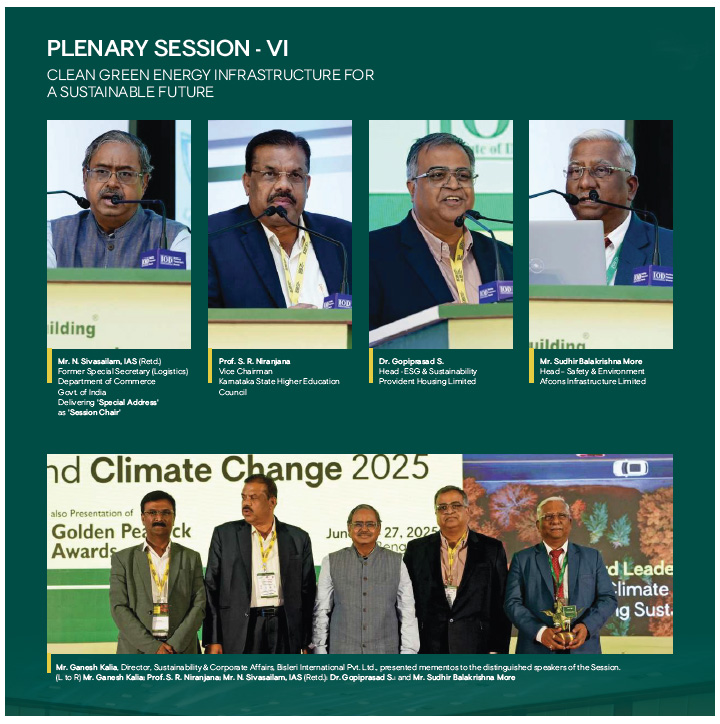
The session was Chaired by:
Mr. N. Sivasailam IAS (Retd.)
Former Special Secretary (Logistics)
Department of Commerce
Govt. of India
Mr. Sivasailam informed that steps were being taken to promote cleaner fuels in the shipping industry. He stated that the use of low-sulphur fuels for ships was being encouraged as part of efforts to reduce marine pollution and improve air quality in port cities. He acknowledged that the cost of electric vehicles (EVs) continues to remain comparatively higher than that of internal combustion engine (ICE) vehicles. However, he indicated that despite this cost difference, there was a clear strategic shift underway towards cleaner and more sustainable mobility solutions. It was also reported that research and pilot projects were being undertaken to explore the potential of green coal, aimed at reducing the carbon footprint of traditional coal usage through cleaner technologies and sustainable practices.
The session had the following distinguished speakers:
1. Prof. S. R. Niranjana
Vice Chairman
Karnataka State Higher Education Council
2. Dr. Gopiprasad S.
Head - ESG & Sustainability
Provident Housing Limited
3. Mr. Sudhir Balakrishna More
Head – Safety & Environment
Afcons Infrastructure Limited
Prof. Niranjana emphasized integrating Environmental Management and Climate Change awareness into higher education. He recommended prioritizing awareness campaigns, campus greening, and adopting a crossdisciplinary approach across academic fields. Experiential learning focused on climate impact and management was vital for equipping students with practical skills. He highlighted the importance of community engagement, outreach programme, and multi-stakeholder partnerships. Universities should enhance data collection and analysis to monitor environmental performance and reduce ecological footprints. He also urged institutions to support educators and students through resources, training, and providing platforms for climate action, and to introduce formal Bachelor's and Master's programme in Environmental Studies. Fostering environmental responsibility among students involves understanding the links between Climate Change, biodiversity loss, pollution, and water scarcity, thereby promoting a holistic view of environmental challenges.
Dr. Gopiprasad emphasized that clean energy adoption is both essential and inevitable for a sustainable future, for mankind stating that a green future cannot be built with a grey mindset. He highlighted the critical role of robust infrastructure, especially power grids, in enabling this transition. While large-scale change poses challenges, he noted it is achievable with the right frameworks, stakeholder incentives, clear goals, and vision. Citing global examples like Germany's shift from fossil fuels to renewables, he illustrated how systematic change can succeed. He pointed to 'solar expansion' in emerging markets and community microgrids in Africa as promising modelsfor the future. Stressing a value-based approach, he concluded that clean energy is not just technological but a cultural shift—aligning people, purpose, and possibilities.
Mr. More stated that today the construction industry accounts for around 36% of global energy consumption. He highlighted renewable energy efforts such as installing solar panels in farms, and streetlights, along with the development of onshore and offshore wind power. He stressed modernising energy infrastructure through smart grids and promoting green building practices using bamboo, fly ash bricks, and recycled concrete, alongside smart building technologies. He also discussed sustainable transport infrastructure, including expanding EV charging networks and electric public transport. He emphasised the need for robust policy and regulatory frameworks, like renewable portfolio standards, to ensure clear targets and accountability in clean energy adoption.
This was followed by an interactive Q&A Session with the audience.
PLENARY SESSION - VII
GOLDEN PEACOCK AWARDS NITE
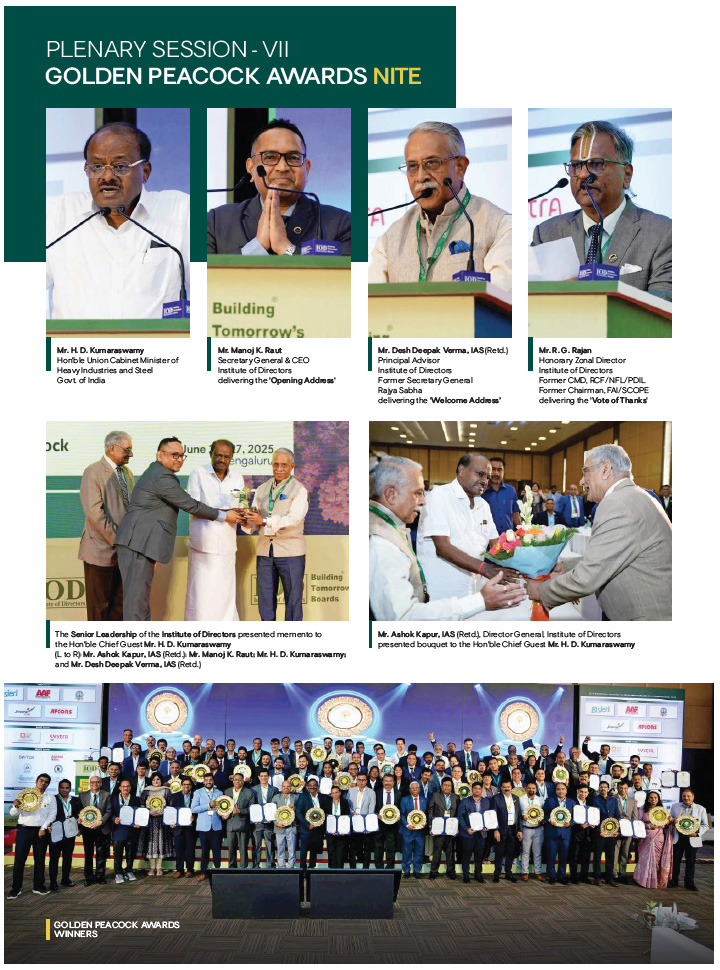
The 'Opening Address' was delivered by:
Mr. Manoj K. Raut
CEO & Secretary General
Institute of Directors, India
Mr. Raut conveyed that recent initiatives reflected a celebration of responsibility, innovation, and leadership, recognising the efforts of individuals and organisations who are driving meaningful change. He highlighted that the Golden Peacock Awards, established by IOD in 1991, have become a respected institution in acknowledging excellence across various industrial sectors. He emphasized the critical role of the boards in shaping organisational priorities, particularly in the areas of sustainability, safety, and innovation. He noted that in today's rapidly evolving landscape, leadership at the highest levels was instrumental in steering companies towards sustainable and responsible practices. He described the GP Awards as a testament to the pioneering work being undertaken to build a cleaner, safer, and more sustainable tomorrow. He concluded by stating that these recognitions serve to honour the enterprising trailblazers who had demonstrated vision, commitment, and impact in their respective fields.
This was followed by the 'Welcome Address' delivered by:
Mr. Desh Deepak Verma, IAS (Retd.)
Principal Advisor - Institute of Directors, India
Former Secretary General, Rajya Sabha
Mr. Verma spoke about the presence of Mr. H. D. Kumaraswamy, the Hon'ble Union Cabinet Minister of Heavy Industries and Steel, Government of India. He highlighted that under his leadership; the Ministry had actively worked on developing mitigation strategies to reduce the carbon footprint of the heavy industries and steel sectors. Apart from his political career, he informed that Mr. Kumaraswamy is also an avid filmmaker. He also stated that during his tenure in the Rajya Sabha, Mr. Kumaraswamy had consistently risen to the occasion, known for his ability to bring the House to order during intense debates and heated discussions. He further noted that his presence coming all the way from Delhi at this prestigious event served to increase the prestige of this Award ceremony. He is regarded as a respected leader who values excellence, innovation, and recognition of outstanding contributions in inter alia, Sustainability.
This was followed by the 'Chief Guest Address' delivered by:
Mr. H. D. Kumaraswamy
Hon'ble Union Cabinet Minister of Heavy Industries and Steel
Govt. of India
Mr. Kumaraswamy observed that while global CO2 emissions had been on the rise, India continued to contribute only 4% to total global greenhouse gas (GHG) emissions. He reaffirmed India's ambitious climate goals, stating that the country aimed to achieve 500 gigawatts of non-fossil fuel energy capacity by 2050, with a broader vision of attaining complete carbon neutrality by 2070. He drew attention to the steel and road transport sectors, which were identified as critical areas for decarbonisation efforts. He mentioned that as the largest market for twowheelers worldwide, India held significant potential for promoting clean mobility solutions at scale. He informed that production-linked incentive (PLI) schemes had been introduced to encourage domestic manufacturing and innovation. He reiterated the significance of the Golden Peacock Awards by describing them as a crucial platform that recognised and honoured organisations demonstrating excellence in sustainability, corporate governance, and innovation, thereby inspiring others to follow suit.
Mr. Kumaraswamy's special talk is featured on the Page No. 39 of this issue.
This was followed by the Presentation of Golden Peacock Awards for Occupational Health & Safety, Environment Management, Energy Efficiency & Eco-Innovation – 2025.
All awardees were physically present at the ceremony and received their Awards in person, having flown into Bengaluru from various parts of the country.
The 'Vote of Thanks' was proposed by:
Mr. R. G. Rajan
Honorary Zonal Director
Institute of Directors, India
Former CMD, RCF/NFL/PDIL,
Former Chairman, FAI/SCOPE
Mr. Rajan expressed his sincere appreciation to Shri H. D. Kumaraswamy, who had flown in especially from New Delhi. Mr. Desh Deepak Verma, Mr. Manoj Raut, and all the distinguished Golden Peacock Award winners, whose presence and contributions has added immense value to the event. He expressed gratitude to all the participants, whose active involvement had made the occasion meaningful and engaging. Special thanks were conveyed directed towards the Hotel Lalit Ashok, for their hospitality and support in hosting the event, as well as to the IOD Head Office and the entire Team of IOD Bengaluru for their dedicated efforts in ensuring the event's success that it was.
PLENARY SESSION - VIII (A)
SUCCESS STORIES ON EFFECTIVE IMPLEMENTATION OF OCCUPATIONAL HEALTH & SAFETY (OHS)
CASE STUDY PRESENTATIONS
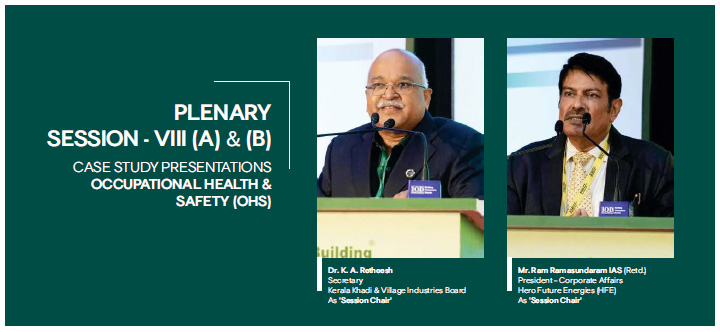
The 'Special Address' was delivered by:
Dr. K. A. Retheesh
Secretary
Kerala Khadi & Village Industries Board
Dr. Retheesh emphasized that employee safety and wellbeing regarded as an organisation's most valuable assets—must remain a top priority across industries. He noted that effective safety practices lead to zero absenteeism, higher morale, and better retention, while neglect continues to cause workplace-related deaths and injuries globally. He stressed the enactment of international standards such as ISO 45001 in enhancing stakeholder trust, safety, credibility, and commitment to employee welfare. India's evolving legal framework has led to positive outcomes, including a 12% overall reduction in fatal accidents. He highlighted how AI and IoT are accelerating progress in Occupational Health & Safety (OHS) by enabling predictive incident prevention and realtime monitoring. He concluded by recommending the integration of OHS into strategic planning, supported by industry–government collaboration, to ensure that every worker returns home safely and in good health.
Case studies in the 'Occupational Health & Safety' category were shared by the below-mentioned companies:
1. Tagros Chemicals India Private Limited
2. Tata Motors Limited
3. Shanthi Gears Limited
4. Himadri Speciality Chemical Limited
5. Afcons Infrastructure Limited
6. TKIL Industries Private Limited
7. Avery Dennison India Private Limited, Bengaluru
8. Larsen & Toubro Limited
Each presentation was followed by an interactive Q&A Session with the large audience.
PLENARY SESSION - VIII (B)
SUCCESS STORIES ON EFFECTIVE IMPLEMENTATION OF OCCUPATIONAL HEALTH & SAFETY (OHS)
CASE STUDY PRESENTATIONS
The session was Chaired by:
Mr. Ram Ramasundaram, IAS (Retd.)
President – Corporate Affairs
Hero Future Energies (HFE)
Case studies in the 'Occupational Health & Safety' category were shared respectively by the belowmentioned companies:
1. Hindustan Petroleum Corporation Limited
2. Seros Energy Private Limited, Navi Mumbai
3. Bharat Petroleum Corporation Limited
4. IndianOil Petronas Private Limited
5. Grasim Industries Limited
6. Mankind Pharma Limited
7. NTPC Limited
8. Nuclear Power Corporation of India Limited
9. ArcelorMittal Nippon Steel India Private Limited
PLENARY SESSION - IX
CORPORATE LEADERSHIP FOR CLIMATE RESILIENT GROWTH: UNLOCKING DEMAND FOR LOW-CARBON PRODUCTS
This session was Chaired by:
Mr. Kaushik Mukherjee, IAS (Retd.)
Former Chief Secretary, Karnataka
Mr. Mukherjee highlighted technological innovations like the Wankel engine as examples of continuous progress in the energy and transport sectors. He stressed the need to assess carbon footprints across the full lifecycle of products and infrastructure—not just at the operational level. Citing windmill companies, he noted that while they may run on wind energy, true footprint assessments must include emissions from resource extraction, manufacturing and infrastructure. He reported that progressive firms are now exploring reuse and recycling of windmill towers. He also advocated for decentralised manufacturing to cut transportation emissions and build resilient local supply chains. Concluding, he emphasised the importance of prioritising 'conscience over profit' to achieve genuine Sustainability.
The session had the following distinguished speakers:
1. Ms. Thulasi Maddineni, IAS
Secretary
Department of Personnel and Administrative Reforms (AR)
Govt. of Karnataka
2. Mr. R. Ravishankar, IFS
Chief Conservator of Forests
Karnataka
3. Mr. Sanjay Agarwal
General Manager Corporate Services
Bharat Electronics, BEL, Ministry of Defence, India
Ms. Maddineni recalled the Volkswagen emissions scandal as a reminder of the consequences of ignoring environmental responsibility and highlighted student protests at Harvard against fossil fuel investments. She stressed that while humanity may survive, quality of life is at risk without urgent action. She noted SEBI's Sustainability Reporting mandates as key to corporate transparency and addressing negative externalities, where disposal costs exceed procurement. Balancing supplier and consumer emissions requires a systemic approach. She observed that more citizens are willing to pay for Sustainability when outcomes are fair and transparent. She concluded that innovation and committed corporate leadership are essential for driving meaningful Climate Action.
Mr. Ravishankar reported that Karnataka's coastline is increasingly vulnerable to climate change, facing threats like rising sea levels, coastal erosion, loss of mangroves and biodiversity, marine litter, and saltwater intrusion into aquifers, posing serious ecological and socio-economic risks. He emphasised the high carbon sequestration capacity of mangrove forests and the need for ESG transparency, net zero commitment, and plastic neutrality. He highlighted the social enterprise, which mobilised coastal fishing communities to recover ocean plastic, nets, and discarded gear—supporting both marine conservation and livelihoods. He concluded that climate interventions must be tailored to the unique ecological, social, and economic realities of each coastal region.
Mr. Agarwal shared that his organisation is actively pursuing its Mission “Net Zero” with a defined roadmap and measurable targets, beginning its journey in 2006 with wind energy. By the end of the year, it aims to operate entirely on 100% renewable energy. On water conservation, his organisation is now water positive, having created a 170 million-litre rainwater reservoir, 45 recharge pits, a sump, and a reuse tank. He highlighted the BEL campus ecological balance, with 46 trees per employee and 65% green cover. His organisation's Net Zero vision includes robust GHG monitoring, energy efficiency measures, and Renewable Energy 10 (RE 10) initiatives. Plans also involve developing green data centres to reduce energy use and emissions. Comprehensive efforts are underway to cut Scope 1, 2, and 3 emissions, along with carbon offsetting and removal, ensuring a holistic approach to minimising environmental impact across the value chain.
This was followed by an interactive Q&A Session with the audience.
PLENARY SESSION - X
SUCCESS STORIES ON: EFFECTIVE IMPLEMENTATION OF 'ENERGY EFFICIENCY '
CASE STUDY PRESENTATIONS
The 'Special Address' was delivered by:
Mr. R. G. Rajan
Honorary Zonal Director
Institute of Directors
India Former CMD, RCF/NFL/PDIL
Former Chairman, FAI/SCOPE
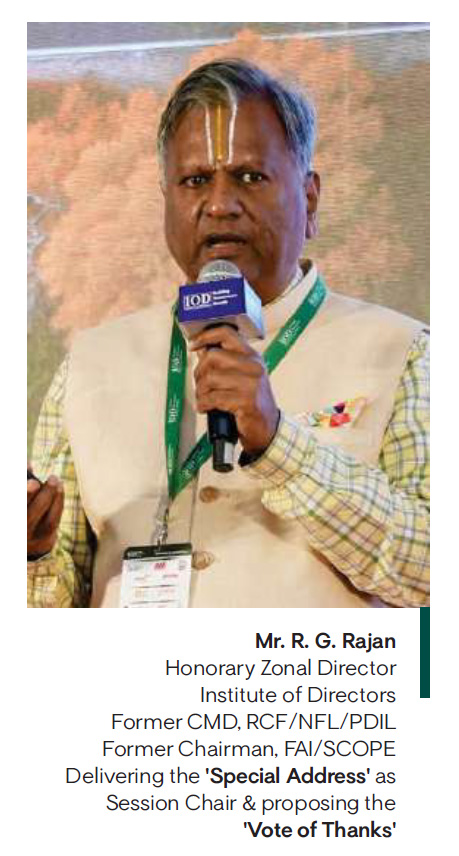
Mr. Rajan highlighted eco-innovation in fertilizers as vital for sustainable agriculture and environmental protection. He reported progress in efficient fertilizers like slow release, controlled-release, and stabilized variants that delay nutrient conversion processes. He also emphasized bio-based and organic fertilizers such as compost, manure, and seaweed-based products, along with advances in microbial and nano fertilizers for targeted nutrient delivery. A key development that he shared was Green Ammonia, produced with zero CO₂ emissions, which could revolutionize urea production. He stressed the role of a circular economy in recovering nutrients like NPK from waste streams. Finally, he underlined the integration of digital technologies—IoT, AI, and drones—to optimize fertilizer use, reduce overuse, increase productivity, and lower agricultural carbon emissions.
Case studies in the 'Energy Efficiency' category were shared by the below-mentioned companies:
1. Tata Motors Limited, Jamshedpur
2. Prism Johnson Limited
3. Grasim Industries Limited
4. L&T Heavy Engineering
5. Hindalco Industries Limited
6. JSW Steel Limited, Dolvi
Each presentation was followed by an interactive Q&A Session with the audience.
CONCLUSION
The 26th International Conference on Environmental Management and Climate Change, 2025 underscored that addressing climate change is an urgent global responsibility transcending sectors, geographies, and hierarchies. Through insightful Plenary Sessions, case studies, and success stories, the Conference had reinforced the need for collaborative leadership and innovation-driven, inclusive solutions.
A strong consensus had emerged: Sustainability and climate resilience must extend beyond policy into boardrooms, industries, academia, and communities. Discussions highlighted transitions underway in sectors like steel, construction, transport, and agriculture, enabled by 'green hydrogen', renewable energy, smart infrastructure, and 'circular economy' models.
Despite challenges such as the economic viability of clean technologies and regulatory checks, the event showcased actionable solutions through collaboration, capacity building, and grassroots engagement. Community efforts and corporate leadership were recognized as vital contributors to sustainable development.
The Golden Peacock Awards has honored exemplary organizations and individuals advancing environmental stewardship through innovation and commitment. The Conference concluded by reaffirming that bold leadership, shared responsibility, and public-private cooperation are key to securing a sustainable, low-carbon future, with India poised to play a defining role amongst the nations.
IOD is especially grateful to its Event Partners:
Our Gold Partners:
1. Bisleri International Private Limited.
2. AAF International
3. Bangalore Water Supply and Sewerage Board
4. Jindal Steel and Power Limited
5. Afcons Infrastructure Limited
Our Silver Partners:
1. REC Limited
2. Systra Group
Our Bronze Partners:
1. Central Warehousing Corporation
2. NLC India Limited
3. Karnataka Soaps and Detergents Limited
4. Switch Mobility
5. The Singareni Collieries Company Limited
6. Bharat Electronics Limited
7. Karnataka Rural Infrastructure Development Limited
8. MECON Limited
9. Karnataka State Minerals Corporation Limited
10. ArcelorMittal Nippon Steel India Limited
Our Associate Partners:
1. TATA Motors Limited
2. Gemini Equipment and Rentals Private Limited
3. Steel Authority of India Limited
4. Mysore Sales International Ltd.
Our Supporting Partner:
1. World Environment Foundation
This report is compiled by:
Mr. Ashok Kapur, IAS (Retd.)
Director General
Institute of Directors, India
&
CS Sana Rehman
Executive Editor – Director Today
Institute of Directors, India
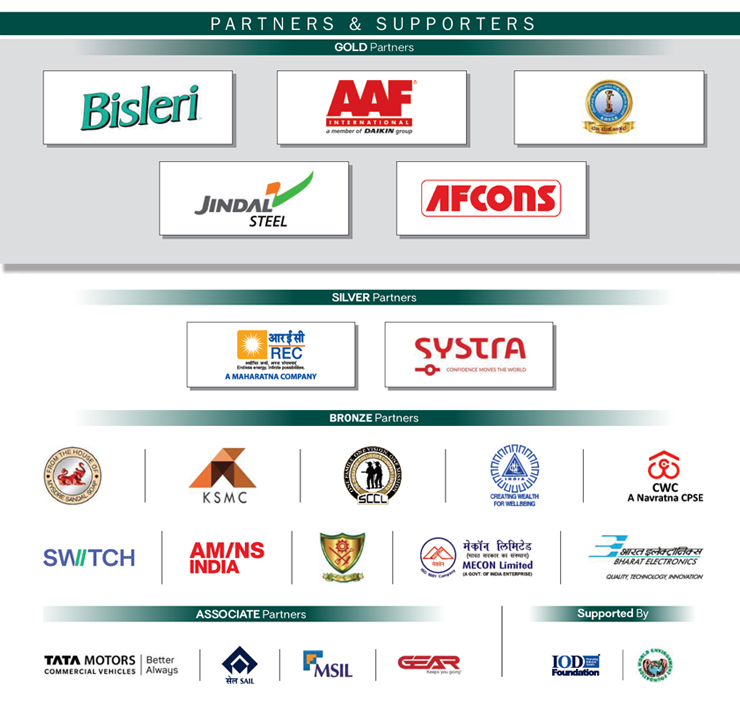
Author

Institute of Directors India
Bringing a Silent Revolution through the Boardroom
Institute of Directors (IOD) is an apex national association of Corporate Directors under the India's 'Societies Registration Act XXI of 1860'. Currently it is associated with over 31,000 senior executives from Govt, PSU and Private organizations of India and abroad.
Owned by: Institute of Directors, India
Disclaimer: The opinions expressed in the articles/ stories are the personal opinions of the author. IOD/ Editor is not responsible for the accuracy, completeness, suitability, or validity of any information in those articles. The information, facts or opinions expressed in the articles/ speeches do not reflect the views of IOD/ Editor and IOD/ Editor does not assume any responsibility or liability for the same.

 Quick Links
Quick Links
 Connect us
Connect us




 Back to Home
Back to Home






























